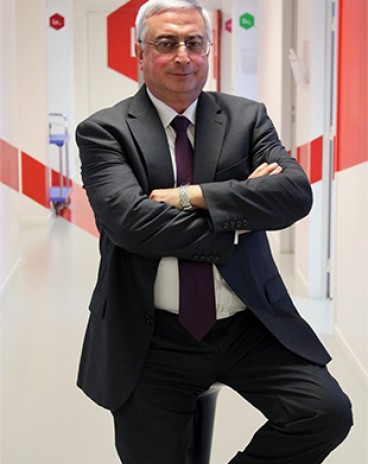Ο καθηγητής Georges Hadziioannou (University of Bordeaux) θα πραγματοποιήσει 2 διαλέξεις στα πλαίσια των διαλέξεων στο ΠΜΣ στη Χημεία σχετικά με τα πολυμερικά υλικά και τις σύγχρονες τεχνολογικές εφαρμογές τους σε εύκαμπτα και εκτυπώσιμα οργανικά ηλεκτρονικά συστήματα.
Διαλέξεις
1. Physical Chemistry: General Introduction to Thermodynamics of polymers (with a short mention to phase diagrams). Block copolymer self-assembly with an emphasis on aspects of Block copolymer in organic solar cells.
Παρασκευή 14/3/2025 (12:00)
Αίθουσα ΒΧ2 Τμήματος Χημείας, Ισόγειο Βόρειου Κτιρίου
2. Processing of Polymer Semiconductors: Polymer Semiconductor Properties, Physics and Mechanics.
Τρίτη 18/3/2025 (14:00)
Αίθουσα Σεμιναρίων Τμήματος Χημείας, Ισόγειο Βόρειου Κτιρίου
Abstract
Polymer printed flexible electronics is an emerging, highly interdisciplinary and disruptive technology. It concerns the deposition of formulated functional polymer inks, (electroactive dielectrics, semiconductors, conductors and insulators), on flexible substrates to form electronic components and their integrated systems. Already, polymer electronics systems complement classical electronic systems, since, due to their “soft nature”, there are able to retain excellent performances under various kinds of mechanical deformations, thus exhibiting potential in achieving flexible, stretchable, deformable, portable, lightweight, and wearable electronic devices such as organic light-emitting diodes, organic photovoltaics, organic field-effect transistors, bioelectronics, sensors, energy storage and conversion devices.
A brief presentation will be given on the evolution over the last hundred years of two major parallel developments, namely communication and information science and technology as well as polymer science and engineering, on the shoulders of which the emerging “polymer printed flexible electronics” science and technology rest.
Further, some milestones will be presented of the above emerging science and technology, enabling to meet important challenges for our society in the energy, environment, security, or health sectors and Internet of Thinks (IoT).
Short Biography
 Georges Hadziioannou is Chemistry Professor at the University of Bordeaux since 2009. His career is characterized by a strong commitment to fundamental research at different universities and research institutes worldwide and an important industrial tenure at IBM Almaden Research Laboratory (San Jose, California).
Georges Hadziioannou is Chemistry Professor at the University of Bordeaux since 2009. His career is characterized by a strong commitment to fundamental research at different universities and research institutes worldwide and an important industrial tenure at IBM Almaden Research Laboratory (San Jose, California).
He has pioneered work on nanostructured polymers materials with innovations in flexible and printable organic electronic materials as well as energy and information technologies. His research area covers semi-conducting polymers, nanostructured polymer materials, polymer materials for the storage and transfer of information, organic electronics and systems thereof.
Throughout his career, he has been deeply involved in teaching at the undergraduate and graduate levels and has guided a substantial number of young scientists. In addition to education and research, Prof. Hadziioannou had numerous and important management positions and he participated in various administrative committees along his entire career: Holder of the Industrial Chair ANR/Arkema/Isorg/Surys/Valeo SMILE “Smart Polymer Ferrotronic Materials for Environmental Monitoring and Energy Conversion; Member of the ARKEMA Corporate Scientific Board; Senior Member of the IUF, Chair of “Physical chemistry of Polymers”; >450 publications (H = 71, cited 17,006) in internationally peer-reviewed journals; 45 patents; Invited and keynote speaker at many conferences (167 since 1994); 65 PhD supervised; More than 75 post-docs and invited professors hosted in his laboratory; Co-founder of 2 start-ups: “Polymer Service Center” now “PolyVation” for the scientific advice of small and medium-sized businesses, and “Papyron” for the development of innovative technologies for electronic paper; Past and present member of many scientific advisory boards of many institutions and member of the editorial boards: ChemPhysChem from its creation until 2004, Advanced Materials, Macromolecules and ACS Macro Letters.